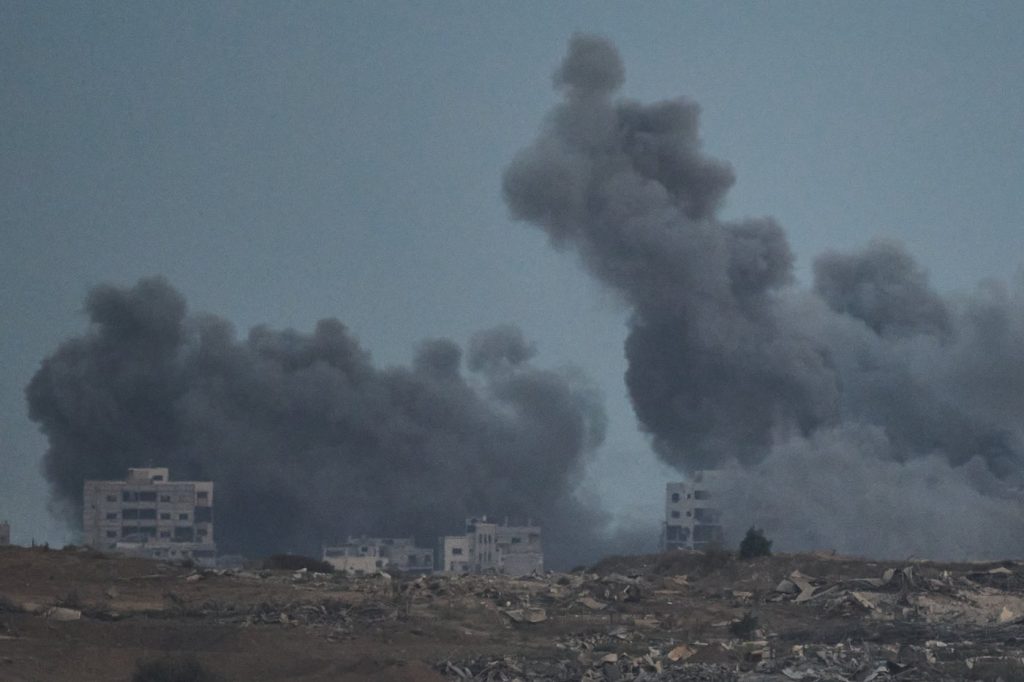DEIR AL-BALAH, Gaza Strip (AP) – Palestinians in Gaza are following the latest endeavors to halt the ongoing war and secure the release of hostages with a mixture of anticipation, cautious optimism, and skepticism. Israeli and Hamas officials convened on Monday for indirect discussions in Egypt.
Ahmed Hashem, a father of four from Jabaliya refugee camp, expressed hope that the negotiations would succeed. He stated, "We’re all praying that they will succeed this time and the war stops," while following the news on his phone. The talks revolve around a U.S.-drafted peace plan aimed at ending the war in Gaza, coinciding with the eve of the second anniversary of the Israel-Hamas conflict. Hamas has indicated that the negotiations will focus on an initial ceasefire that involves the partial withdrawal of Israeli forces and the release of hostages held in Gaza in exchange for Palestinian prisoners in Israeli custody.
The conflict, which escalated following Hamas's attack on Israel on October 7, 2023, has resulted in the deaths of tens of thousands of Palestinians, alongside vast destruction and displacement in Gaza. Families have been forced to move repeatedly, creating distressing images of children suffering from severe hunger.
Essam Hararah, a 55-year-old Palestinian from northern Gaza, hopes these negotiations will provide a resolution to the ongoing human suffering. He highlighted the deplorable conditions in Gaza, especially in Muwasi, where many live in crowded tents after being displaced from their homes. Ayman al-Masri, another Palestinian, voiced optimism regarding Hamas’s agreement to release all hostages and noted a perceived increase in U.S. President Donald Trump’s interest in securing peace, particularly due to his aspirations for a Nobel Prize.
This latest peace push comes after Hamas expressed willingness to accept some aspects of the U.S. peace plan, a move received positively by Trump. Israel has also indicated support for the renewed U.S. initiative. Trump believes that Hamas is prepared for a “lasting peace” and has urged Israel to cease operations in Gaza, warning that “all bets will be off” if Hamas does not act promptly. Nevertheless, Israeli forces continued airstrikes, resulting in at least 19 fatalities, according to the territory’s Health Ministry.
As hopes intertwine with skepticism, Hussein Abu Arabiya, a displaced resident of Jabaliya, shared his prayers for the ceasefire to succeed. He articulated the exhaustion felt by the people after two years of displacement: “We are very tired,” he lamented. In contrast, Nabila Shunnar expressed doubt due to past letdowns, stating, “We are two years into this war, and we have not seen any progress or anything on the ground that would make us hopeful.” Moreover, uncertainties surrounding Gaza's future persist, with Mohamed Abu Taha suggesting that the war will not conclude unless Hamas relinquishes its control over the area.
A Hamas statement on Friday indicated their willingness to release hostages and transfer power to other Palestinian factions, although it did not address disarmament—a critical demand from Israel. Despite the release of many hostages during ceasefire agreements, Hamas has faced criticism for its role in the conflict, which resulted in 251 abductions and an estimated 1,200 deaths on October 7, predominantly among civilians.
The ongoing war has led to more than 67,000 Palestinian fatalities, with more than half reported as women and children, according to Gaza’s Health Ministry. Although these figures are part of the Hamas-run government, they are often considered the most reliable estimates by independent experts and the U.N. Amid this turmoil, Omar Nashar from Khan Younis maintains cautious optimism, highlighting considerable regional and international pressure on the situation. However, he cautioned that political motivations might obstruct progress, particularly in the case of Israeli Prime Minister Benjamin Netanyahu.
Nashar concluded with a plea for sustained international and Arab pressure to support continued negotiations aimed at ending the war, facilitating reconstruction, and enabling displaced individuals to return home.










